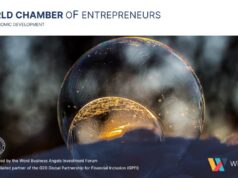Francisco Banha explains in this article why we have to foster entrepreneurship education and develop better public policies to serve to this mission. He shares some insights from different EU countries on outputs of entrepreneurship education.
He was a guest editor of the World Class Startup magazine’s special edition for the Global Fundraising Stage of the World Congress of Angel Investors, WBAF 2022. Angel Investor Review now shares his article with its subscribers online. Francisco Banha, PhD is CEO of the Gesventure, S.A., the School of Economics – University of Algarve.
 Since the days of Schumpeter, entrepreneurship has been acknowledged as an important economic driving force and a propeller of development, hand in hand with innovation. This topic has been brought to the fore in more recent decades, especially after Peter Drucker’s book Innovation and Entrepreneurship: Practices and Principles of 1985, in which the relation between the two concepts of the title becomes clear and structured. If we are to believe in this premise, then we also need to recognise the need to foster entrepreneurship education (EE). Indeed, the relationship between an increase in entrepreneurial initiatives and the implementation of EE programmes in compulsory education and lifelong learning has been academically established and there are strong signs that public policies concerning entrepreneurship should pay attention to its educational dimension. In order to sustain an entrepreneurial ecosystem, education is fundamental – and pays off, in the long run.
Since the days of Schumpeter, entrepreneurship has been acknowledged as an important economic driving force and a propeller of development, hand in hand with innovation. This topic has been brought to the fore in more recent decades, especially after Peter Drucker’s book Innovation and Entrepreneurship: Practices and Principles of 1985, in which the relation between the two concepts of the title becomes clear and structured. If we are to believe in this premise, then we also need to recognise the need to foster entrepreneurship education (EE). Indeed, the relationship between an increase in entrepreneurial initiatives and the implementation of EE programmes in compulsory education and lifelong learning has been academically established and there are strong signs that public policies concerning entrepreneurship should pay attention to its educational dimension. In order to sustain an entrepreneurial ecosystem, education is fundamental – and pays off, in the long run.
In fact, entrepreneurship (and EE, by extension) has entered the political discourse. Although entrepreneurship is by no means a recent topic, since the early 2000s it has been gaining momentum; it has attracted the attention of policymakers and decision-makers alike, while scholars have managed to expand the field, stabilise concepts and come up with new avenues of research.
Judging by the high number of recommendations and literature published on entrepreneurship, financial literacy and the importance of innovation, EE seems a relevant topic for national and supranational institutions. Important academic and governmental institutions have demonstrated a positive stance concerning the need to raise awareness for entrepreneurship and the potential benefits of introducing its principles early in life (European Commission, European Council, United Nations, OECD, among others). Despite all of this praise and the fact that EE has gained attention from employers and policymakers committed to the entrepreneurship cause, EE has failed to enter the policy-making agenda in many countries.
Even in political structures such as the EU that go to great lengths to homogenise every aspect of the quality of life (education and equal opportunities included), there are asymmetries regarding the ratio of implementation of EE in compulsory schooling and the methods used. One of the main reasons for this is that EU recommendations are not binding on its member states.
There is evidence that countries such as Denmark, Poland and Estonia have adopted recommendations and managed to boost their economies due to their investment in EE throughout the last decades. These countries put public policies in place for the spread of EE programmes and choose to apply its values transversally throughout the curricula and syllabi. That is why they became case studies for best practices.
On the other hand, countries such as Portugal have been struggling for many years to disseminate and implement EE. In my doctoral research (Banha, 2020), carried out at the University of Algarve, it became clear that only a few students and teachers had been exposed to EE. Even in countries where EE is less established, the distribution of people taking part in EE programmes and initiatives is unequal among regions. A recent highlight from the Global Entrepreneurship Monitor brings attention to this topic by stating that a whole generation of schoolchildren throughout the world does not have access to EE programmes. In a recently conducted research in which I took part, published in Education Sciences (Banha, Coelho and Flores, 2022), the conclusions of the literature review pointed to the scarce attention given to the specific topic of decision- making processes concerning EE.
However, it is an extraordinary feat that, in many places, we are no longer discussing “if” EE should be extended to school-age children, but “how” EE can be efficiently implemented and “what” it can channel to make today’s youth better individuals, citizens, innovators and entrepreneurs in the future. EE is about preparing people for creating a network and establishing a viable business that will hopefully provide innovation and better the community and everything that comes with that, no doubt. But it can be much more than that.
Over the years, EE has proven to be a good vehicle to provide knowledge and convey messages that are of paramount importance in today’s context – regardless of local idiosyncrasies or of a global mindset. Interdisciplinarity, to name but one of the key elements that are at the very root of EE, is a fundamental premise to align students and early-stage entrepreneurs with sustainability, as conceptualised in the Brundtland report, i.e. social, economic and environmental. Furthermore, EE can be a way to help push forward and articulate the UN sustainable development goals (with the broader economy). It is also an excellent environment to show students the important role of entrepreneurs in local and global societies and encourage children to become more proactive, beneficial and responsible in the exercise of their social participation.
One of the most interesting ways in which EE is currently being articulated is through the STEAM framework: science, technology, engineering, arts and maths. This methodology brings out and to the fore EE’s full interdisciplinary potential, for the benefit of students and communities alike. By allowing the students to “connect the dots” between these disciplines, STEAM is better preparing them to tackle issues effectively, help with problem-solving and hone different sensibilities.
Ultimately, all of this is in the name of progress and prosperity. The role of the entrepreneur is not just to be an agent of the present, but also to imagine and help carve the future. Governments and institutions can only do so much for entrepreneurial ecosystems. No legislative spree to create and underpin these platforms can be complete without contemplating the foundations. Chief among them, I would argue, is education. WS
____________________________
Francisco Banha, PhD, CEO – Gesventure, S.A., the School of Economics – University of Algarve



























